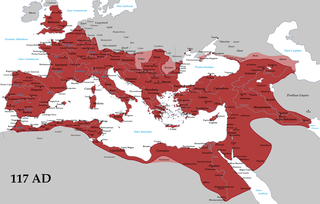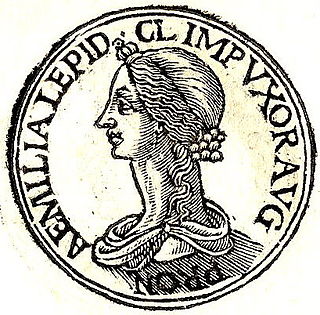Gaius Anicius Cerialis (died 66) was a Roman senator who was active during the Principate. He was suffect consul in the second half of the year 65 as the colleague of Gaius Pomponius Pius. [1]

The Roman Empire was the post-Roman Republic period of the ancient Roman civilization. Ruled by emperors, it had large territorial holdings around the Mediterranean Sea in Europe, North Africa, and West Asia. From the constitutional reforms of Augustus to the military anarchy of the third century, the Empire was a principate ruled from the city of Rome. The Roman Empire was then divided between a Western Roman Empire, based in Milan and later Ravenna, and an Eastern Roman Empire, based in Nicomedia and later Constantinople, and it was ruled by multiple emperors.

The Principate or early Roman Empire is the name sometimes given to the first period of the Roman Empire from the beginning of the reign of Augustus in 27 BC to the end of the Crisis of the Third Century in 284 AD, after which it evolved into the so-called Dominate.

A consul held the highest elected political office of the Roman Republic, and ancient Romans considered the consulship the highest level of the cursus honorum.
Beyond his consulate, Cerialis appears three times in history. The first time was during the reign of Caligula when he was accused of majestas against the emperor. Cassius Dio provides a confused account. [2] Steven H. Rutledge provides an interpretation that makes sense of Dio: Cerialis and another senator, Sextus Papinius, were tortured, but neither provided any information. The emperor then offered to spare Papinius' life if he were to denounce his fellow conspirators, which he did; Caligula then had both "Cerialis" and the men he named executed. [3] It is likely that by "Cerialis" Dio means Papinius, for Anicius Cerialis is very much alive years later.

Caligula was Roman emperor from AD 37 to AD 41. The son of the popular Roman general Germanicus and Augustus' granddaughter Agrippina the Elder, Caligula was born into the first ruling family of the Roman Empire, conventionally known as the Julio-Claudian dynasty. Germanicus' uncle and adoptive father, Tiberius, succeeded Augustus as emperor of Rome in AD 14.
Cassius Dio or Dio Cassius was a Roman statesman and historian of Greek origin. He published 80 volumes of history on ancient Rome, beginning with the arrival of Aeneas in Italy. The volumes documented the subsequent founding of Rome, the formation of the Republic, and the creation of the Empire, up until 229 AD. Written in Ancient Greek over 22 years, Dio's work covers approximately 1,000 years of history. Many of his 80 books have survived intact, or as fragments, providing modern scholars with a detailed perspective on Roman history.
The year before his election as consul the Pisonian conspiracy was uncovered. Nero delivered a speech wherein he shared the news and named the conspirators, and their punishments. The Senate then voted for a thanksgiving, and other acts flattering the emperor. Tacitus recounts other servile acts, which includes an account based on the Acta Senatus that Cerialis proposed a temple be built as soon as possible at public expense to "the Divine Nero". [4]
The conspiracy of Gaius Calpurnius Piso in AD 65 was a major turning point in the reign of the Roman emperor Nero. The plot reflected the growing discontent among the ruling class of the Roman state with Nero's increasingly despotic leadership, and as a result is a significant event on the road towards his eventual suicide and the chaos of the Year of the Four Emperors which followed.

Nero was the last Roman emperor of the Julio-Claudian dynasty. He was adopted by his great-uncle Claudius and became Claudius' heir and successor. Like Claudius, Nero became emperor with the consent of the Praetorian Guard. Nero's mother, Agrippina the Younger, was likely implicated in Claudius' death and Nero's nomination as emperor. She dominated Nero's early life and decisions until he cast her off. Five years into his reign, he had her murdered.

PubliusCornelius Tacitus was a senator and a historian of the Roman Empire. The surviving portions of his two major works—the Annals and the Histories—examine the reigns of the emperors Tiberius, Claudius, Nero, and those who reigned in the Year of the Four Emperors. These two works span the history of the Roman Empire from the death of Augustus, in 14 AD, to the years of the First Jewish–Roman War, in 70 AD. There are substantial lacunae in the surviving texts, including a gap in the Annals that is four books long.
The last time Cerialis appears in history is also during the reign of Nero. The year after Cerialis' consulate, in AD 66, Tacitus recounts how a delator , or informer, accused Annaeus Mela under the lex maiestas. Faced with certain destruction, Mela made his will and committed suicide. In his will, he accused Rufrius Crispinus, a former commander of the Praetorian guard, and Cerialis of majestas. Tacitus states that it was commonly believed Mela named Crispinus because the man had already taken his life; Cerialis was named because Mela wanted him dead. Cerialis soon afterwards committed suicide to avoid prosecution. [5]
Delator is Latin for a denouncer, i.e. who indicates to a court another as having committed a punishable deed.
Suicide was a widespread occurrence in antiquity. There were many different forms used and many different reasons for committing suicide. Because taking one’s own life is morally confrontational, there are many different viewpoints on suicide. These viewpoints, although some may consider them modern, took root in ancient times.
Rufrius Crispinus was an equestrian who lived during the later Julio-Claudian dynasty. The satirist Juvenal spitefully described him as one the "dregs" of the "Nile", indicating his Egyptian origin. It is believed he came to Rome as a fish merchant. Under the Roman Emperor Claudius he was the commander of the Praetorian Guard. In 47, he suppressed a rebellion and was promoted by the Senate to the rank of praetor and was given one and half a million sesterces.
